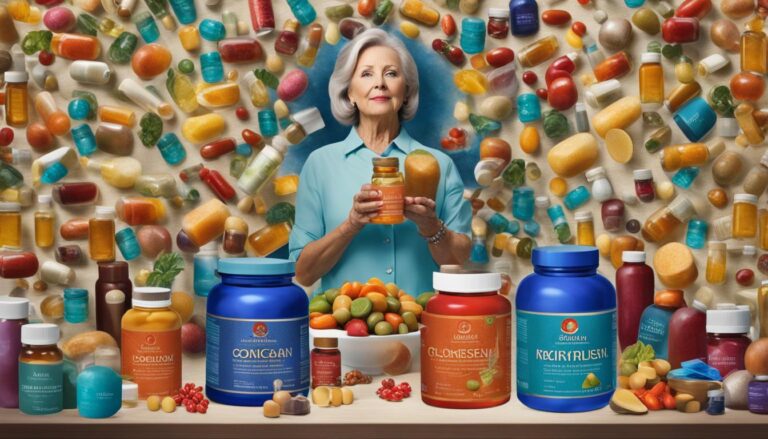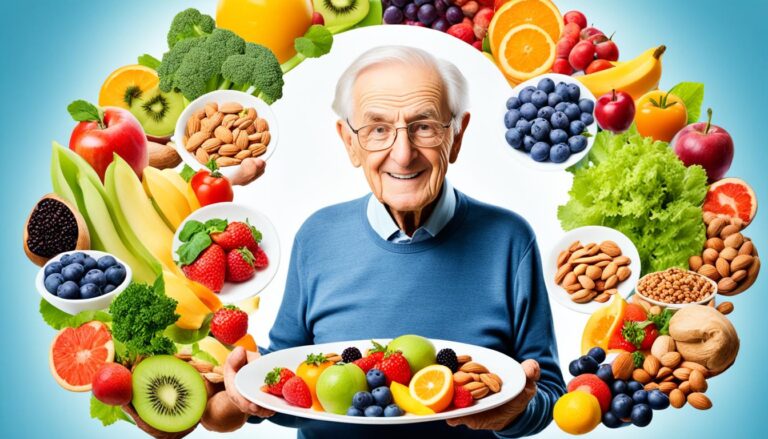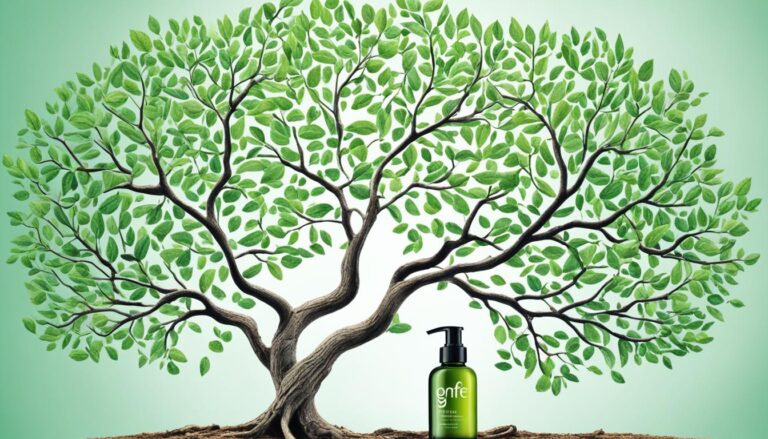Discover my slow aging diet plan for healthy aging for Lifelong Vitality
Slow aging diet plan for healthy aging. Have you ever looked in the mirror and wondered where the years have gone? I know I have. As the years pass by, it’s natural for us to reflect on our aging process and contemplate ways to age gracefully. We all strive for that inner vitality that shines through in our appearance, energy levels, and overall well-being.
For me, the pursuit of healthy aging became a personal journey. I witnessed my parents age with grace and vitality, and I couldn’t help but wonder what their secret was. That’s when I decided to embark on a mission to develop my own slow aging diet plan – a holistic approach to nourishing my body and mind to support lifelong vitality.
In this article, I’m excited to share with you the principles and strategies that have helped me tremendously in my quest for healthy aging. I believe that by adopting a slow aging diet plan, you can enhance your vitality, promote physical well-being, and age gracefully.
So, let’s dive in and discover the power of nutrition, exercise, stress management, and other lifestyle factors to unlock the secrets of healthy aging. Together, we can embark on a journey towards lifelong vitality and embrace the beauty of aging with grace.
Key Takeaways:
- Aging gracefully is a universal desire, and a slow aging diet plan can help us achieve it.
- Nourishing our body and mind is essential for healthy aging and lifelong vitality.
- By adopting a holistic approach to healthy aging, we can promote overall well-being and age gracefully.
- Join me on this journey to uncover the secrets of healthy aging through nutrition, exercise, stress management, and more.
- Together, we can embrace the beauty of aging and live a life of vitality.
Understanding the Aging Process
As we go through life, our bodies undergo a natural aging process that affects our physical and mental well-being. Understanding this process is crucial in order to make informed choices that promote healthy aging and vitality. By adopting a healthy lifestyle, we can slow down the aging process and enjoy a vibrant and fulfilling life.
Natural aging occurs as our cells and tissues naturally deteriorate over time. This leads to a gradual decline in physical and cognitive functions. While aging is inevitable, the rate at which it occurs can be influenced by various factors, including genetics, environment, and most importantly, our lifestyle choices.
“Aging is not lost youth but a new stage of opportunity and strength.” – Betty Friedan
Embracing a healthy lifestyle is crucial in maintaining overall well-being and youthfulness. It involves making conscious choices regarding our diet, physical activity, stress management, and other lifestyle habits. By adopting healthy habits, we can protect our cells, reduce oxidative stress, and slow down the aging process.
The Impact of Lifestyle Choices on Aging
Our lifestyle choices play a significant role in how our bodies age. Unhealthy habits such as smoking, excessive alcohol consumption, poor nutrition, and sedentary behavior can accelerate the aging process and increase the risk of age-related diseases. On the other hand, adopting a healthy lifestyle can have a profound impact on our physical and mental well-being as we age.
Aging gracefully begins with nourishing our bodies from the inside out. A diet rich in antioxidants, vitamins, and minerals can help combat oxidative stress and promote cellular repair. Regular exercise improves cardiovascular health, strengthens muscles and bones, and enhances cognitive function. Effective stress management techniques, such as mindfulness and meditation, can reduce the negative impact of chronic stress on our bodies.
By understanding the aging process and the influence of lifestyle choices, we can take proactive steps to slow down the process and live a healthy and fulfilling life as we age.
| Lifestyle Choices | Effect on Aging Process |
|---|---|
| Healthy Diet | Provides essential nutrients, antioxidants, and phytochemicals to support cellular health and combat oxidative stress. |
| Regular Exercise | Improves cardiovascular health, strengthens muscles and bones, and enhances cognitive function. |
| Stress Management | Reduces the negative impact of chronic stress on the body and supports overall well-being. |
The Foundations of a Slow Aging Diet
In my journey towards healthy aging, I have discovered that the food we consume plays a crucial role in how we age. Adopting an anti-aging diet rich in age-defying foods can significantly support our quest for vitality and well-being. Here, I will delve into the key components of a slow aging diet and highlight the importance of incorporating these foods into our daily meals.
Nourishing Foods for Radiant Health
When it comes to an anti-aging diet, the focus is on consuming nutrient-dense foods that provide essential vitamins, minerals, and antioxidants. These nutrients help protect our cells from the damaging effects of free radicals and contribute to overall health and vitality.
“Let food be thy medicine and medicine be thy food.” – Hippocrates
By including a variety of fruits, vegetables, whole grains, lean proteins, and healthy fats in our diet, we can nourish our bodies and support healthy aging from within. These foods provide a wide range of essential nutrients that promote cellular repair, reduce inflammation, and boost our immune system.
The Power of Antioxidants
A key component of an age-defying diet is incorporating foods rich in antioxidants. Antioxidants are compounds that help neutralize free radicals, which are unstable molecules that contribute to cellular damage and accelerate the aging process.
Dark leafy greens such as spinach, kale, and Swiss chard are excellent sources of antioxidants, vitamins, and minerals. They help protect our cells from oxidative stress and reduce the risk of age-related diseases.
Berries such as blueberries, strawberries, and raspberries are packed with antioxidants called anthocyanins. These powerful compounds have been shown to improve brain function, support heart health, and reduce the risk of chronic diseases.
Fatty fish like salmon, sardines, and trout are rich in omega-3 fatty acids. These healthy fats have anti-inflammatory properties and promote heart health, brain function, and skin elasticity.
Creating a Balanced Plate
A slow aging diet emphasizes the importance of creating a balanced plate that includes a variety of food groups. Aim to fill half of your plate with colorful fruits and vegetables, one-quarter with whole grains, and one-quarter with lean proteins or plant-based alternatives.
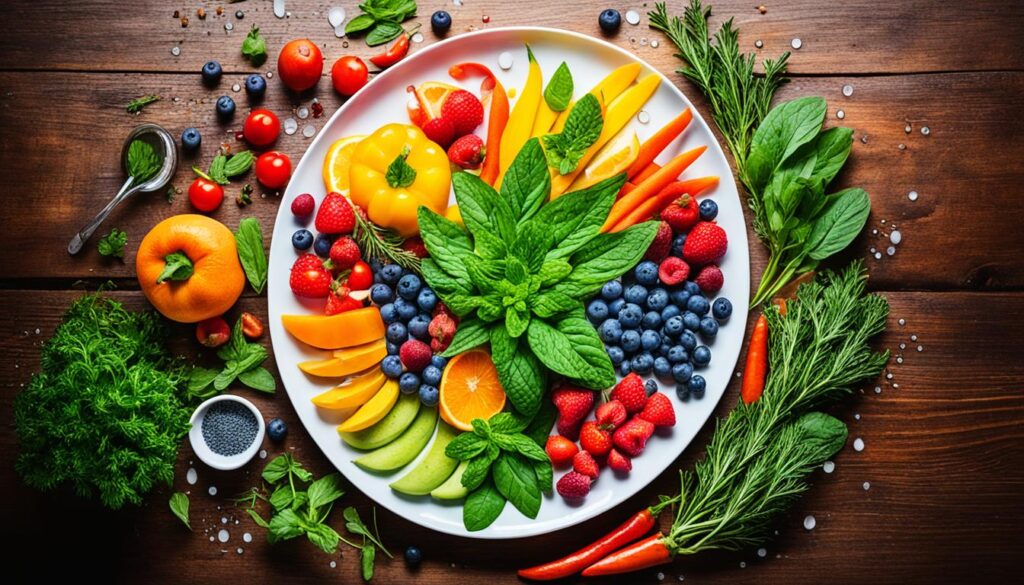
Remember to choose whole, unprocessed foods whenever possible and limit your intake of refined sugars, saturated fats, and processed snacks. Opting for organic, locally sourced, and seasonal ingredients can further enhance the nutritional value of your meals.
Nourishing Your Body with Nutrient-Rich Foods
Proper nutrition plays a crucial role in promoting anti-aging and maintaining healthy aging habits. Including a variety of nutrient-rich foods in your diet can help support your body’s needs as you age gracefully.
Here are some key foods that should be incorporated into your slow aging diet plan:
| Food Group | Examples |
|---|---|
| Fruits and Vegetables | Berries, leafy greens, citrus fruits, cruciferous vegetables |
| Whole Grains | Quinoa, brown rice, oats, whole wheat bread |
| Healthy Fats | Avocados, nuts and seeds, olive oil, fatty fish |
| Lean Protein | Chicken, fish, legumes, tofu |
| Dairy or Dairy Alternatives | Greek yogurt, almond milk, cottage cheese |
By incorporating these nutrient-rich foods into your diet, you can provide your body with the essential vitamins, minerals, antioxidants, and other nutrients needed for healthy aging.
To further enhance the effectiveness of your slow aging diet plan, consider integrating superfoods that are known for their anti-aging properties:
- Blueberries: Packed with antioxidants that help combat oxidative stress and inflammation.
- Spinach: Rich in nutrients such as vitamin C, beta-carotene, and folate, which support skin health and provide anti-aging benefits.
- Salmon: A great source of omega-3 fatty acids, which promote heart health and reduce the risk of age-related diseases.
- Walnuts: Contain high levels of antioxidants and omega-3 fatty acids, supporting brain health and reducing the risk of cognitive decline.
Remember, a well-balanced and nutrient-rich diet is essential for healthy aging. By nourishing your body with the right foods, you can support your overall well-being and promote graceful aging.

Embracing Anti-Aging Superfoods
When it comes to healthy aging, incorporating anti-aging superfoods into your diet can be a game-changer. These nutrient-dense foods are packed with vitamins, minerals, and antioxidants that support longevity and promote overall well-being. By adding these powerful ingredients to your meals, you can give your body the fuel it needs to age gracefully and maintain optimal health.
Here are some of my favorite anti-aging superfoods:
| Superfood | Benefits |
|---|---|
| Blueberries | Rich in antioxidants that combat inflammation and oxidative damage, supporting brain health and reducing the risk of age-related diseases. |
| Salmon | High in omega-3 fatty acids, which promote heart health, reduce inflammation, and support brain function. |
| Avocado | Packed with healthy fats and antioxidants that nourish the skin, protect against wrinkles, and support cardiovascular health. |
| Spinach | Loaded with vitamins, minerals, and antioxidants that promote eye health, boost the immune system, and strengthen bones. |
| Almonds | Rich in vitamin E, which helps to maintain healthy skin and hair, and provides essential nutrients for bone health. |
Incorporating these superfoods into your meals is easier than you might think. Try adding blueberries to your morning oatmeal, enjoying a grilled salmon salad for lunch, or snacking on a handful of almonds as an afternoon pick-me-up. By embracing these anti-aging superfoods, you can nourish your body from the inside out and reap the benefits of a longevity diet.
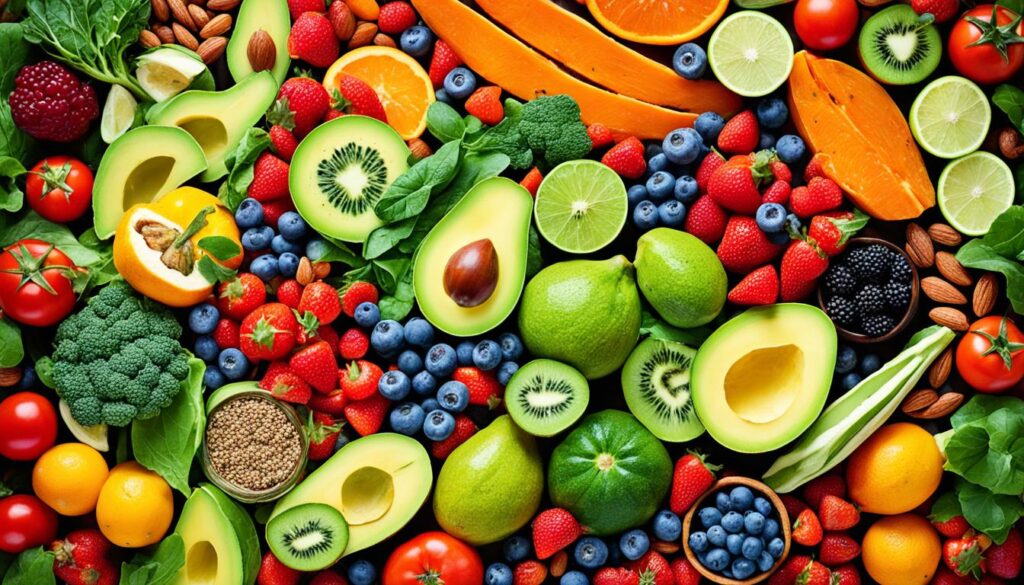
Remember, a healthy aging diet isn’t just about what you eat but also about how you prepare and enjoy your meals. Be mindful of portion sizes, choose organic and locally sourced ingredients whenever possible, and savor each bite with gratitude. These small lifestyle changes can make a big difference in promoting healthy aging and vitality.
The Importance of Hydration for Healthy Aging
Proper hydration is a crucial aspect of maintaining a healthy aging process. As we age, our body’s water content decreases, making it even more important to prioritize hydration. Staying hydrated not only benefits your overall well-being but also supports various bodily functions that contribute to healthy aging.
Dehydration can lead to a range of health issues, including fatigue, cognitive decline, and impaired physical performance. By prioritizing hydration, you can optimize your body’s functions and promote a vibrant and youthful lifestyle.
Here are some practical tips and strategies to ensure you stay hydrated for optimal vitality:
- Drink plenty of water: Aim to drink at least eight glasses of water per day. Carry a reusable water bottle with you as a reminder to stay hydrated throughout the day.
- Include hydrating foods: Certain fruits and vegetables have high water content, such as watermelon, cucumbers, and oranges. Incorporating these foods into your diet can contribute to your overall hydration.
- Limit dehydrating beverages: Avoid excessive consumption of caffeinated and alcoholic beverages, as they can contribute to dehydration. If you do indulge, remember to compensate by drinking extra water.
- Create hydration habits: Set reminders or establish a routine to drink water at regular intervals. This will help ensure that hydration becomes a consistent and mindful habit in your daily life.
I cannot stress enough how important it is to prioritize hydration for healthy aging. It’s a simple yet powerful step you can take towards supporting your overall well-being and promoting a youthful lifestyle.
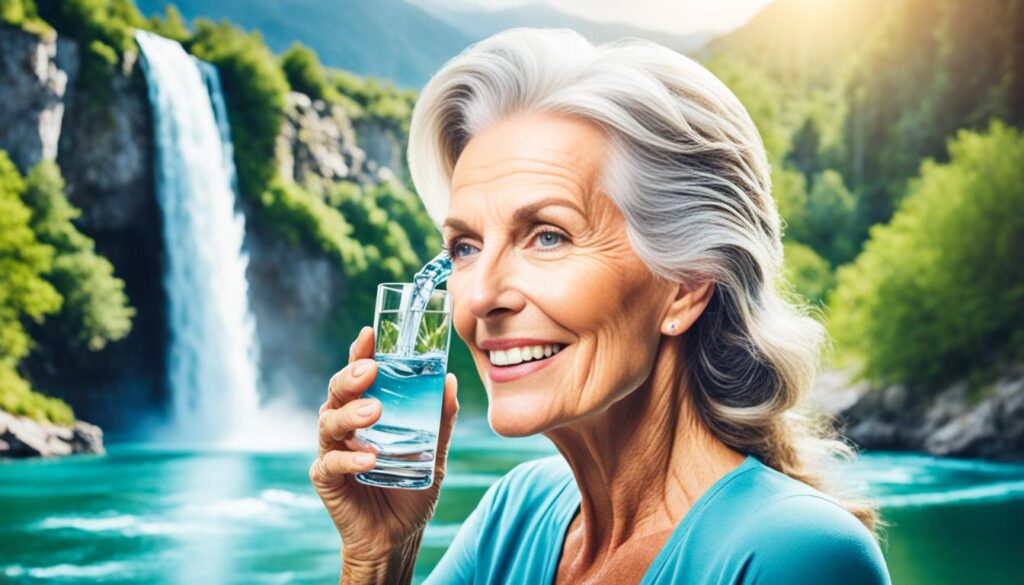
| Benefits of Hydration for Healthy Aging | Consequences of Dehydration |
|---|---|
| 1. Maintains optimal cellular function | 1. Fatigue and low energy levels |
| 2. Supports cognitive function and memory | 2. Impaired cognitive performance |
| 3. Promotes healthy digestion and elimination | 3. Digestive issues such as constipation |
| 4. Enhances joint lubrication and flexibility | 4. Joint pain and stiffness |
| 5. Boosts skin hydration and elasticity | 5. Dry, dull, and aged-looking skin |
By practicing good hydration habits and incorporating hydrating foods and beverages into your daily routine, you can proactively support your healthy aging journey. Remember, every sip counts towards nourishing your body and promoting vitality!
Incorporating Exercise for Age-Defying Benefits
When it comes to healthy aging and aging gracefully, regular exercise plays a pivotal role. Engaging in physical activity not only helps us maintain our physical fitness but also offers a multitude of age-defying benefits. By incorporating exercise into our daily routines, we can enhance our overall well-being and promote a healthy lifestyle.
Exercise has been proven to have numerous advantages for healthy aging. It helps improve cardiovascular health, strengthen muscles and bones, boost metabolism, and increase flexibility and balance. Moreover, regular exercise can have a positive impact on our mental and emotional well-being, reducing stress and anxiety.
To make the most of your exercise routine, it’s best to combine different types of activities, including aerobic exercises, strength training, and flexibility exercises. Aerobic exercises, such as brisk walking, cycling, or swimming, help improve cardiovascular fitness and increase endurance. Strength training exercises, like weightlifting or resistance training, help build muscle mass and strength to counteract age-related muscle loss. Flexibility exercises, such as stretching or yoga, enhance joint mobility and prevent stiffness.
Here are some age-defying exercise routines and tips to help you maintain physical fitness as you age:
- Start with low-impact exercises like walking or swimming if you’re new to exercise or have any joint issues.
- Incorporate strength training exercises using resistance bands, dumbbells, or weight machines to build and maintain muscle.
- Engage in balance exercises like tai chi or yoga to improve stability and prevent falls.
- Include flexibility exercises in your routine to enhance range of motion and prevent muscle imbalances.
- Set realistic goals and gradually increase the intensity and duration of your workouts to avoid injury.
- Stay consistent and make exercise a regular part of your daily routine for long-term benefits.
“Exercise is the closest thing we have to a fountain of youth. It has the power to improve not only our physical health but also our cognitive function and emotional well-being.” – Expert quote
Remember, the key to successful and sustainable exercise is finding activities that you enjoy. Whether it’s dancing, hiking, playing a sport, or participating in group fitness classes, choose activities that make you feel good and keep you motivated. Don’t be afraid to explore different options and adapt your exercise routine as you age.
By prioritizing regular exercise and incorporating age-defying routines, you can embrace a healthy aging journey and enjoy the benefits of a strong and vibrant body throughout your life.
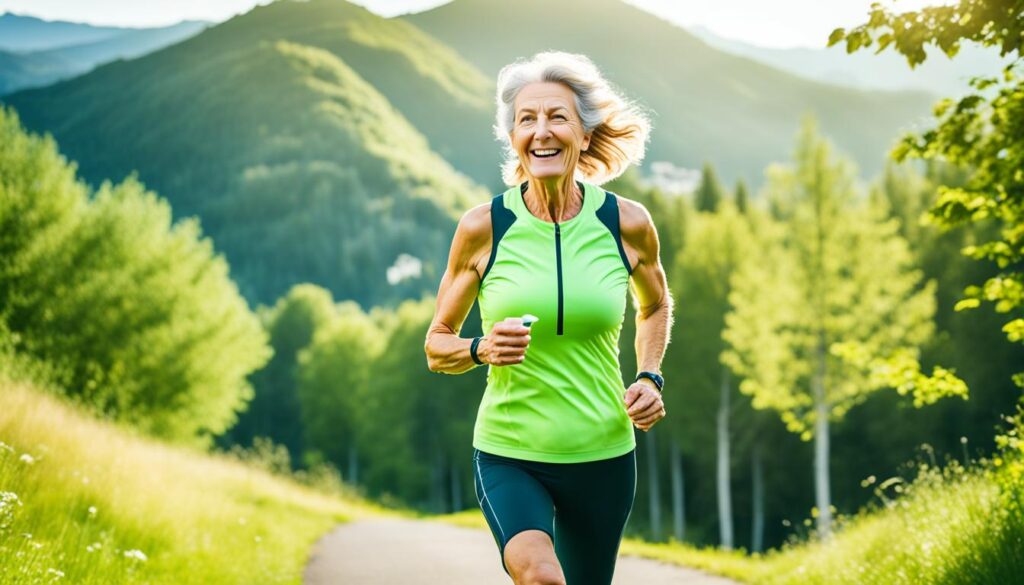
| Age-Defying Exercise Routine | Benefit |
|---|---|
| Aerobic exercises | Improves cardiovascular health and increases endurance |
| Strength training exercises | Builds muscle mass and strength, counteracts age-related muscle loss |
| Flexibility exercises | Enhances joint mobility and prevents stiffness |
| Balance exercises | Improves stability and prevents falls |
Managing Stress for Longevity and Well-Being
Stress is a common part of our modern lives, but its impact on our health and well-being should not be underestimated. When it comes to healthy aging, effectively managing stress is crucial. Chronic stress can affect our physical and mental health, leading to faster aging and a decline in overall well-being.
To age well and maintain a healthy lifestyle, it is important to adopt stress management techniques that promote longevity and inner balance. Here are some strategies that I have found helpful in managing stress:
- Practice mindfulness: Take time each day to cultivate mindfulness through activities such as meditation, deep breathing exercises, or yoga. Mindfulness helps reduce stress and promotes a sense of calmness and clarity.
- Engage in regular exercise: Physical activity is not only beneficial for our physical health but also for managing stress. Engaging in regular exercise releases endorphins, which act as natural mood boosters and stress reducers. Find an exercise routine that suits your preferences and make it a part of your healthy aging routine.
- Take breaks and relax: Give yourself permission to take breaks and engage in activities that help you relax and unwind. Whether it’s reading a book, going for a walk in nature, or spending time with loved ones, find activities that bring you joy and help you recharge.
- Practice self-care: Prioritize self-care activities that nourish your mind, body, and soul. This can include getting enough sleep, maintaining a healthy diet, staying hydrated, and engaging in activities that bring you joy and fulfillment.
Remember, stress is a part of life, but how we manage it makes all the difference. By incorporating stress management techniques into your healthy aging routine, you can enhance your overall well-being and promote longevity.
“The greatest weapon against stress is our ability to choose one thought over another.” – William James
With conscious effort and the adoption of stress management techniques, you can age well and maintain a healthy lifestyle. Taking care of your mental and emotional well-being is just as important as taking care of your physical health. By managing stress effectively, you can support healthy aging and enjoy a fulfilling life.

Promoting Brain Health for Cognitive Aging
As we age, cognitive health becomes increasingly important for maintaining overall well-being and quality of life. Promoting brain health through healthy aging habits is crucial in ensuring that our minds stay sharp and agile. Here, I will discuss some effective dietary and lifestyle strategies that can support brain health as you age.
Nourish Your Brain with Nutrient-Rich Foods
Proper nutrition plays a vital role in supporting cognitive function and healthy aging. Incorporating nutrient-rich foods into your diet can provide your brain with the essential vitamins, minerals, and antioxidants it needs to function optimally. Here are some brain-boosting foods to consider:
- Leafy green vegetables, such as spinach and kale, are rich in antioxidants and vitamins that promote brain health.
- Fatty fish like salmon, tuna, and sardines are high in omega-3 fatty acids, which have been shown to improve brain function.
- Blueberries are packed with antioxidants that protect the brain from oxidative stress and may improve memory.
- Walnuts, almonds, and other nuts are excellent sources of antioxidants, omega-3 fatty acids, and vitamin E, all of which are beneficial for brain health.
By incorporating these foods into your diet, you can nourish your brain and support cognitive aging.
Engage in Mental Stimulation
Just like physical exercise is crucial for maintaining a healthy body, mental exercise is essential for keeping your brain sharp as you age. Engaging in mentally stimulating activities can help improve cognitive function and prevent cognitive decline. Here are some activities that can provide mental stimulation:
- Reading books, newspapers, or magazines
- Doing puzzles and crosswords
- Learning a new skill, such as playing a musical instrument or speaking a foreign language
- Engaging in social activities that require mental thinking and interaction
By incorporating these activities into your daily routine, you can provide your brain with the exercise it needs to stay strong and agile.
Get Adequate Sleep
Quality sleep is crucial for brain health and cognitive function. During sleep, your brain processes and consolidates information, which is essential for memory and learning. Lack of sleep can impair cognitive abilities and lead to cognitive decline over time. To promote healthy aging and brain health, prioritize getting the recommended 7-9 hours of quality sleep each night.
Manage Stress
Chronic stress can have detrimental effects on brain health and cognitive function. Prolonged exposure to stress hormones can damage brain cells and impair memory and cognitive abilities. To mitigate the impact of stress on brain health, practice stress management techniques such as mindfulness meditation, deep breathing exercises, and engaging in activities that bring joy and relaxation.

By taking proactive steps to promote brain health through a combination of nutrient-rich foods, mental stimulation, quality sleep, and stress management, you can support healthy cognitive aging and enjoy a sharp mind for years to come.
Balancing Hormones for Optimal Aging
In my journey towards healthy aging, I have discovered that hormonal balance plays a crucial role in optimizing the aging process. Hormones act as chemical messengers in our bodies, regulating various bodily functions and influencing our overall well-being. By maintaining hormonal equilibrium, we can experience the benefits of graceful aging and improved vitality.
One key aspect of achieving hormone balance is adopting a healthy aging diet that is specifically designed to support hormonal health. Incorporating anti-aging nutrition into your meals can help regulate hormone production, enhance cellular function, and promote overall well-being.
Here are some essential tips and natural remedies to support hormonal health and improve the aging process:
- Include hormone-balancing foods: Incorporate hormone-balancing foods such as avocados, coconut oil, flaxseeds, and fermented foods like sauerkraut and kimchi into your diet. These foods contain essential nutrients and healthy fats that support hormone production and balance.
- Manage stress: Chronic stress can disrupt hormonal balance. Incorporate stress management techniques such as mindfulness meditation, yoga, or deep breathing exercises into your daily routine to reduce stress levels and support hormonal health.
- Get quality sleep: Lack of sleep can affect hormone production and lead to imbalances. Aim for 7-9 hours of uninterrupted sleep each night to support hormone optimization.
- Stay active: Regular exercise has been shown to improve hormonal balance. Engage in activities that you enjoy, such as walking, swimming, or dancing, to support healthy aging and hormonal health.
- Consider herbal remedies: Certain herbs, such as maca, ashwagandha, and chasteberry, have been traditionally used to support hormonal balance. Consult with a healthcare professional to determine the appropriate herbal remedies for your individual needs.
“Achieving hormonal balance is essential for optimal aging. By adopting a healthy aging diet and incorporating stress management techniques, exercise, and herbal remedies, we can support our hormones and age gracefully.”
By implementing these tips into your lifestyle and ensuring hormonal balance, you can promote optimal aging and enhance your overall well-being. Remember, healthy aging is a holistic journey that encompasses nutrition, exercise, stress management, and hormonal health. Embrace this holistic approach to turn back the clock and age gracefully.
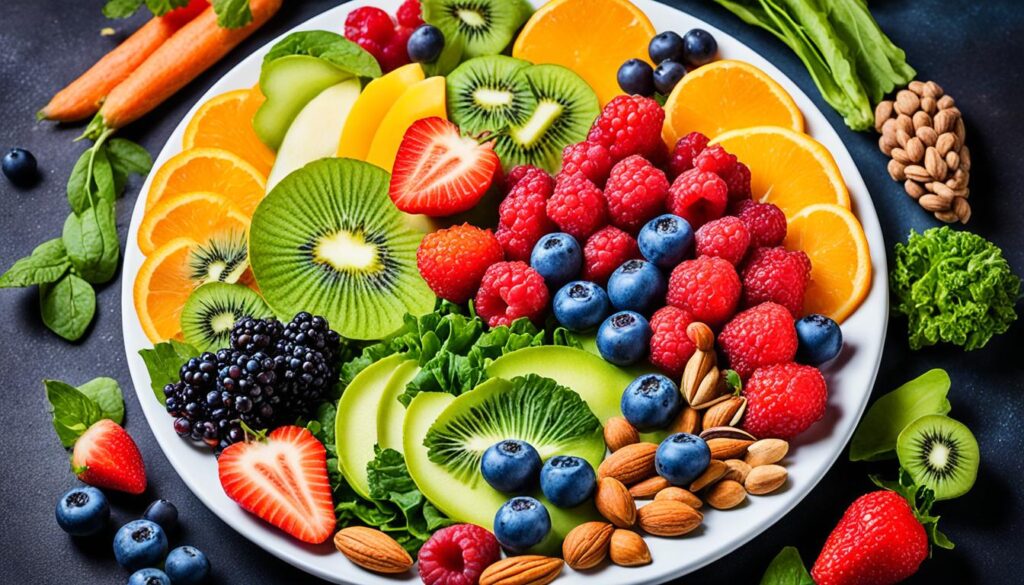
Conclusion
After exploring the principles of a slow aging diet, it is clear that adopting healthy aging habits is essential for promoting overall well-being and vitality. By nourishing our bodies with nutrient-rich foods and incorporating anti-aging superfoods into our meals, we can provide the necessary fuel for healthy aging.
In addition to proper nutrition, regular exercise plays a crucial role in aging well. By engaging in age-defying exercise routines, we can maintain physical fitness and support the aging process. It is also important to manage stress effectively, as it can have a significant impact on our overall health and longevity.
Furthermore, supporting brain health and balancing hormones are key aspects of healthy aging. By prioritizing cognitive health through proper nutrition and engaging in activities that stimulate the brain, we can promote cognitive function as we age. Balancing hormones naturally can also contribute to optimal aging and overall well-being.
In essence, adopting a holistic approach to healthy aging, encompassing nutrition, exercise, stress management, brain health, and hormonal balance, is crucial. By implementing these strategies into our daily lives, we can age gracefully and enjoy a fulfilling and vibrant lifestyle.
FAQ
What is a slow aging diet plan?
A slow aging diet plan is a holistic approach to nutrition aimed at promoting healthy aging and vitality. It focuses on consuming nutrient-rich foods, incorporating anti-aging superfoods, and supporting overall well-being through hydration, exercise, and stress management.
How does the aging process affect our health?
The aging process is a natural part of life that can impact our health in various ways. As we age, our bodies undergo physiological changes, and our cells and tissues may accumulate damage over time. Adopting a healthy lifestyle, including a nutritious diet and regular exercise, can help slow down the aging process and support overall well-being.
What are some key components of an anti-aging diet?
An anti-aging diet should include a variety of nutrient-rich foods that provide essential vitamins, minerals, antioxidants, and omega-3 fatty acids. It should also incorporate age-defying foods known for their anti-aging properties, such as berries, leafy greens, nuts, seeds, and lean proteins.
How does nutrition contribute to healthy aging?
Proper nutrition plays a crucial role in promoting healthy aging. It provides the necessary nutrients for cellular repair, supports immune function, and helps maintain healthy organs and systems. A slow aging diet plan focuses on consuming nutrient-dense foods that nourish the body and support optimal vitality.
What are some anti-aging superfoods?
Anti-aging superfoods are nutrient-dense foods that have been found to possess properties that promote healthy aging. Examples include blueberries, salmon, turmeric, walnuts, kale, and green tea. These foods are rich in antioxidants, omega-3 fatty acids, and other beneficial compounds that help combat aging at a cellular level.
Why is hydration important for healthy aging?
Staying hydrated is essential for healthy aging as it helps maintain proper organ function, supports digestion, promotes healthy skin, and helps transport essential nutrients throughout the body. Adequate hydration is crucial for maintaining overall vitality and well-being.
How does exercise contribute to age-defying benefits?
Regular exercise has numerous age-defying benefits. It helps maintain muscle mass, improves bone density, promotes cardiovascular health, enhances mood, and supports brain function. Incorporating exercise into your routine can help you age gracefully and maintain physical fitness as you grow older.
What is the impact of stress on the aging process?
Chronic stress can accelerate the aging process and contribute to various health issues. High levels of stress have been linked to increased inflammation, weakened immunity, and worsened cognitive function. Managing stress through relaxation techniques, exercise, and mindfulness practices is vital for healthy aging.
How can we promote brain health as we age?
To promote brain health as we age, it is important to adopt a diet rich in antioxidant-rich foods, omega-3 fatty acids, and nutrients that support brain function, such as vitamin E and B vitamins. Engaging in cognitive activities, physical exercise, and getting enough sleep are also beneficial for maintaining cognitive abilities.
How can hormonal balance impact the aging process?
Hormonal imbalance can affect the aging process and overall well-being. As we age, hormone levels change, and maintaining proper balance becomes crucial. A healthy lifestyle, including a nutrient-rich diet and stress management techniques, can help support hormonal health and optimize the aging process.


